Out of the Camp Ch. 3 – Press Pass
At around the same time, I spent an hour with Gene Pitney and his wife, Lynn and baby son, Todd at their rented mews house in Victoria, somewhere behind Buckingham Palace. Allocating one hour was apparently standard practice back then for such arrangements. To say I felt out-of-my-depth meeting one-on-one with an American superstar would be somewhat of an understatement, but they proved to be a very sweet couple, probably sensing my discomfiture and Lynn made some coffee, and the interview went really well. Lynn is still around I believe as of course is Todd, who is a musician and musical arranger.
Another advantage of the “press pass” was getting easy access to concerts and TVs shows, and the opportunity to have on the spot encounters with featured artists. In those days the most popular TV music programme was ‘Top of the Pops’ and I went to the BBC TV Centre, Wood Lane, White City on one occasion and interviewed Dave Dee, Dozy, Beaky, Mick and Titch who were, despite the dubious name very successful and had a number of chart hits. The Paris Studio in Regent Street was where I caught up with Simon Dupree & the Big Sound, also a highly successful group but who faded fast. I interviewed Stuart Henry the Scottish BBC DJ one evening in The Ship Pub in Wardour Street Soho, during his break from his ‘Whole Lotta Soul’ Show at The Marquee. He’d started his radio career on the pirate ship, Radio Scotland which he’d found really difficult due to his chronic sea sickness so was delighted when he received an offer from Radio 1.
There were also several of my articles published based on material from Press Packs supplied by artists’ management or publicists on the release of their clients’ latest records. I won’t bore you with a litany of encounters with artists long forgotten or never well known that I did interview or whose Press Release I plagiarized but a few well-known names that spring to mind were Cat Stevens, Marmalade, Simon and Garfunkel, Amen Corner, Johnny Cash, and The Foundations. I was to encounter The Foundations again later when wearing yet another hat.
An additional venue that my Press Pass got me into on more than one occasion was The Royal Albert Hall, but a couple of the most memorable occasions was during rehearsals for Andy Williams’ concert with the Henry Mancini Orchestra. To sit around just eight rows from the stage and observe the detail that went into each number was mesmerizing. Much of the time Mancini was dealing with a particular issue or other with the 40-piece orchestra, Andy Williams would be waiting patiently for the issue to be sorted out and sometimes pacing around the stage before they would start again. Sadly, I never had the opportunity to speak to him.
1968 was the year that Cliff Richard, singing ‘Congratulations!’, represented the UK in The Eurovision Song Contest, also held at The Albert Hall, and I covered it, not only the actual concert but I also had access to the Hall each day that week during rehearsals. All the time I was doing my journalist bit I was still living in the hostel and, fortunately, one of my new friends, Jim, a Liverpudlian, was a part-time photographer. He agreed to come with me on one occasion in the hope that he might get some shots of a celebrity or three. It’s really quite an experience being in that huge auditorium, when there is just a handful of people sprinkled around the hall which has a capacity of 5,200, while a full orchestra runs through an arrangement. Jim and I at one point were heading down one of the walkways towards the stage when we saw Cliff Richard sitting alone in the Arena area watching the rehearsals. We couldn’t believe our luck and so approached him and asked if we might take a ‘selfie’ with him. OK! OK! It was 1968 so maybe that’s not exactly what was said, but in any event, he agreed to Jim taking a few pictures. We sat and chatted for 15-20 minutes and he was really very pleasant and relaxed. I did write it up but for some reason the paper never published it.
At this point I was still working at my delivery job. Looking back now I can’t remember or figure out how I was able to do it all because at the same or around the same time I was attending the London Academy of Modelling with a view to earning some extra money. Extra Money, Ha! like I was earning a living wage. Not! Anyway, the training comprised deportment on the catwalk, radio voice overs, TV commercial techniques, holding poses for stills (portraits), etc. Looking back on that now I realize it was a bit of a rip-off, but the Academy was located on Bond Street and the set-up was pretty impressive. Well at least it was to kid from the sticks. I don’t remember now how much it cost but this was the vehicle that helped get me to London, so whatever it cost it was money well spent. There’s a long background story to this that I’ll get to later in an Edinburgh flashback.
Down the street from Victoria Wine there were a number of Georgian Blocks of flats/apartments and we had quite a few customers who lived there. The name Billy Cotton won’t mean a thing to a large proportion of you for two particular reasons. The first is that, as far as I know, he wasn’t well known in the US – but I could be wrong about that. The second reason is that he had a highly popular BBC TV Saturday night variety/big band show in the 50s, so a lot of you weren’t around yet. His son, Bill, became head of BBC Light Entertainment in the 70s and later became BBC Controller. Anyway, as I was saying, Billy lived on Bury Street with his band vocalist, Kathie Kay and, as Michael Cane is alleged to have said – which he always denied – “Not a lot of people know that”.
Lady Wadia lived on another floor in the Bury Street flats and she would often stop by the shop to purchase a bottle or two. I don’t remember what her particular tipple was, only that she was elderly and extremely eccentric, and very, very rich. Other than that, all I remember was that whenever she needed to have anything delivered, she would insist that the manager personally should go to her flat and deliver it himself which, because he was such a nice guy, he did. However, on one occasion he was away and so I was given the dubious task of filling in. There were as I recall a couple of boxes and so I took Steve to give me a hand. We walked down the street into the building and entered the ancient manually-operated, cage lift (elevator), rode up to her floor, rang the bell and waited. After what seemed like an age, Lady Wadia finally opened the door and seemed surprised by our presence there. She told us to wait, closed the door again and reappeared a couple of minutes later holding a pistol, and pointing it at us. She directed us to take the boxes into her flat and I told her we’re not doing anything until she put the gun away. She looked panicked and confused, told us to wait again and once more closed the door. It’s certainly funny looking back but in the moment, knowing that at best she was very odd, who could really know what was going on in her addled mind. In any event she returned a minute or two later and we carried out the delivery without further incident.
p.s. This is by way of an addendum to OotC 3 and is just a few bits and pieces from the 1968 Eurovision Song Contest that I came across in an old trunk. Most of it is self-explanatory but, in addition to the pic of Cliff from the evening’s programme, I added Pat McGeagan the Irish entrant in case anyone’s interested, but also Massiel, the Singer who represented Spain and who won the contest. It was revealed a few years later that representatives of General Franco, the dictator who remained in power until 1975, had gotten to some of the East European judges and ‘persuaded’ them to switch their votes. So, if that’s true Cliff should have won since he was placed second.
Images.
(1) Sitting in the stalls at the Royal Albert Hall, London chatting with Cliff Richard during rehearsals of the 1968 Eurovision Song Contest. (2) – (7) Articles I had published in the Edinburgh Weekly. (8) Envelope addressed to me at my London office in the Bayswater LHA hostel!) (9) BBC letter with my Eurovision invitation. (10) Tickets with a note from the Beeb expressing desperation at the shortage of tickets and asking ‘for pity’s sake, don’t waste them’ in so many words. (11) Radio Times cover. (12 – (14) Contestant Posters.
Right on my man!
Thank you Joane. I’m glad you like it and delighted that you’ll come back. As we say in Scotland, “Haste…
Thank you for your kind words Taina. Please do visit again…, as often as you like.
I’m glad you like it Allegro. Thank you for checking it out and taking the time to comment.







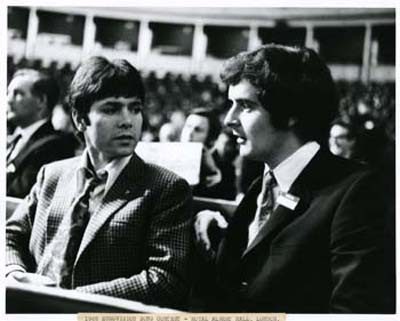
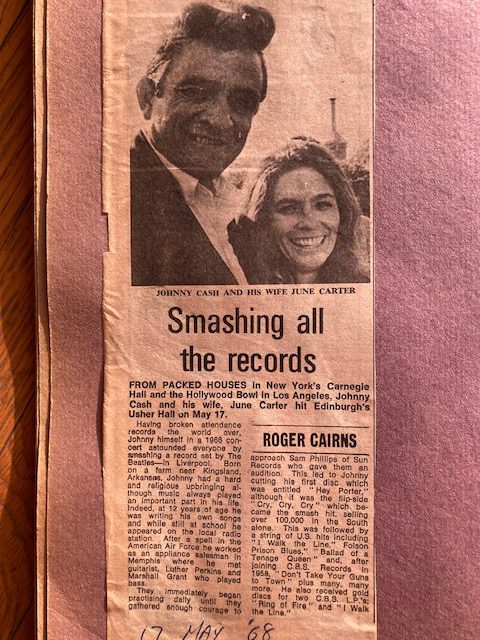
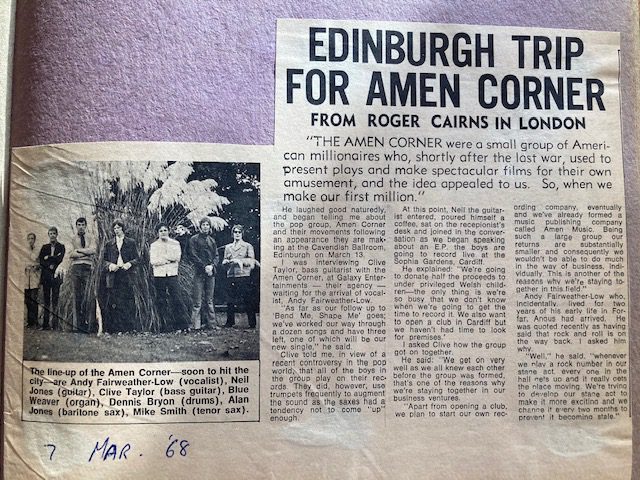
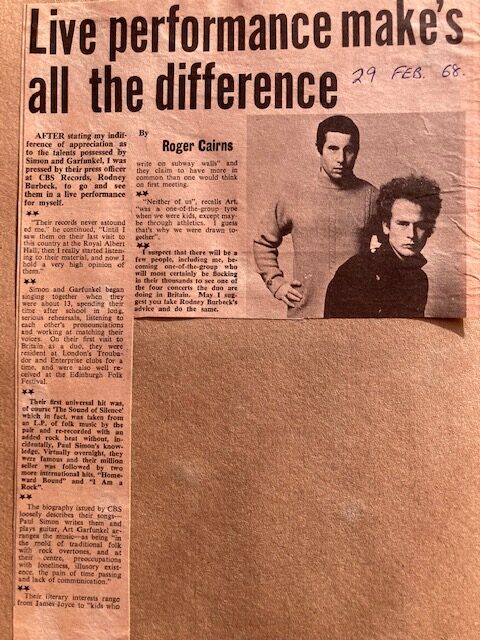
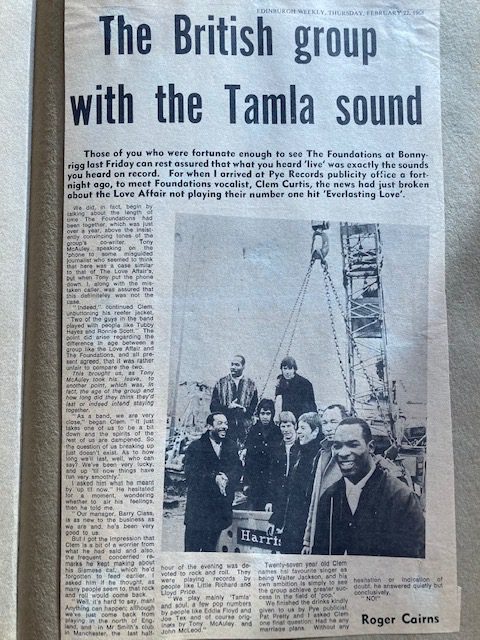
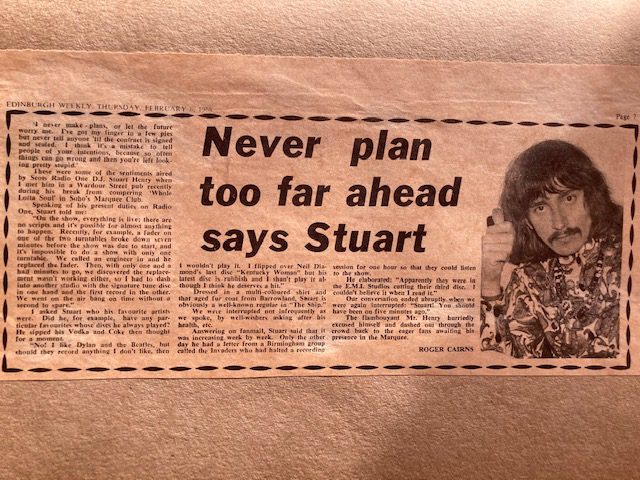
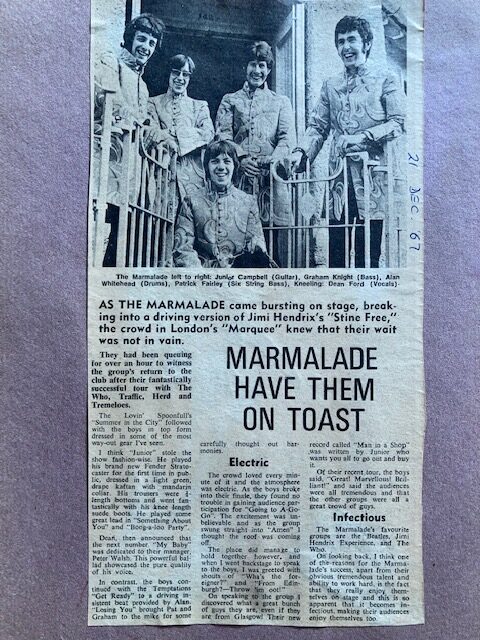
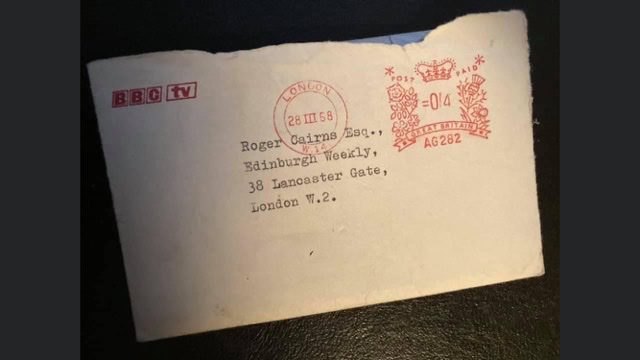
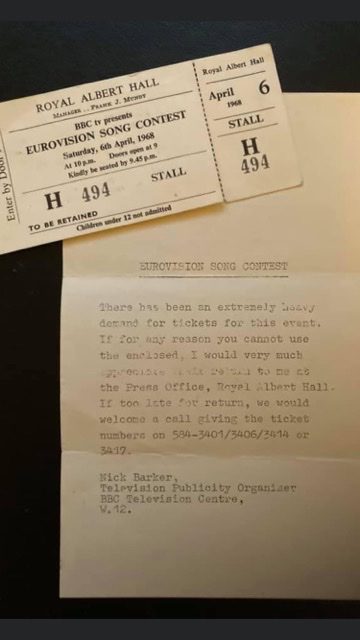
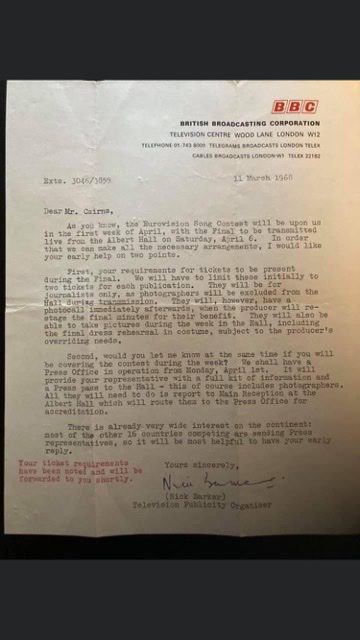
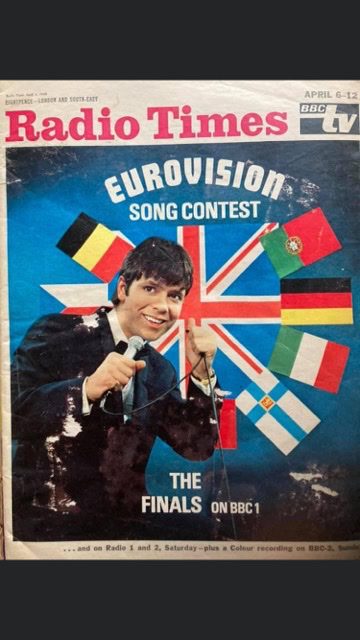
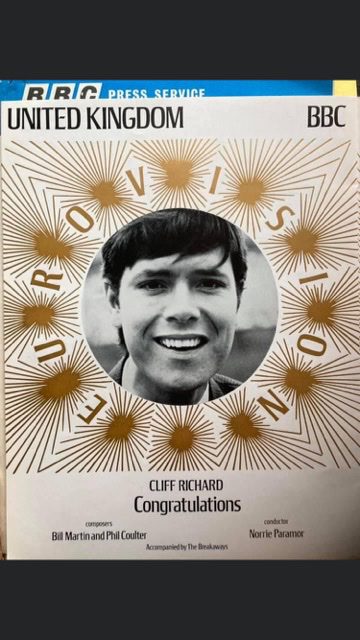
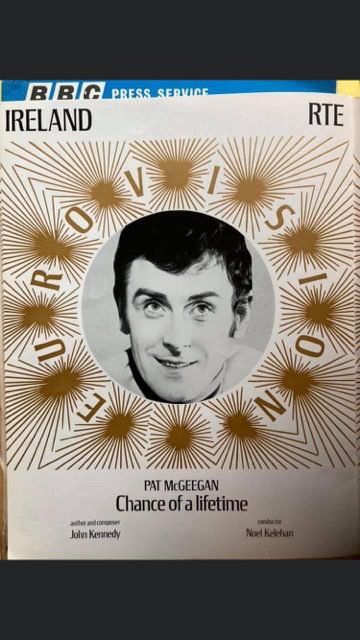
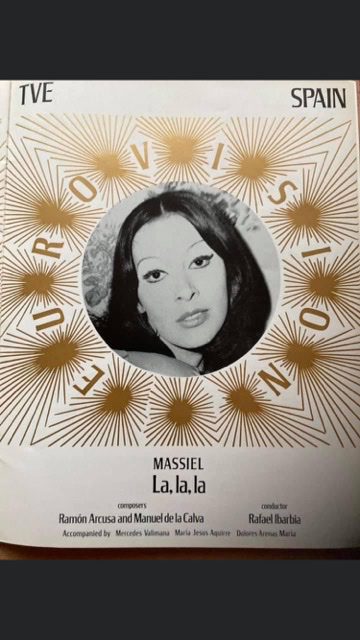
👍